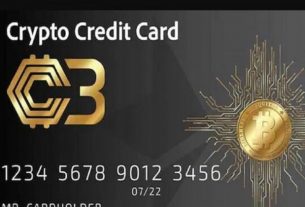Crypto Credit Cards If you already hold some form of cryptocurrency, you may be wondering how and where to spend your digital funds in the real world. From buying a cup of coffee to earning crypto rewards, crypto credit and debit cards can help create a seamless transaction experience holding, earning and spending crypto, and might be the right choice for those of us looking for an easier way to spend our funds.

Crypto debit cards vs. crypto credit cards
The use of Crypto Credit Cards and debit cards continues to grow, with Visa (V) customers making $2.5 billion in payments in crypto-linked cards in the first fiscal quarter of 2022. Both crypto credit cards and debit cards allow holders to pay for goods and services by converting cryptocurrency into fiat currency at the point of payment.
Crypto debit cards function like traditional debit cards in that they take funds from the account immediately, so the account needs to be topped off using cryptocurrency linked to an individual exchange account or crypto account. Traditionally, users would have to convert their crypto through centralized exchanges, which would then wire them funds that can be spent – a process that can take hours to days. Crypto debit cards allow you to spend your crypto without having to move money around first.
Both Visa and Mastercard (MA) offer crypto debit cards in partnership with well-known exchanges including:
ADVERTISEMENT
- Coinbase Card, a Visa debit card that allows users to earn crypto back on every purchase
- BitPay Debit Card, a prepaid Mastercard that instantly reloads your balance with no conversion
- Crypto.com Visa Card, a prepaid card that allows users to add funds using bank account transfers, other credit or debit cards, or cryptocurrency
Some crypto debit cards, like the Crypto.com Visa card, require users to stake tokens native to their platforms for a period of time in order to qualify for a card, while other cards, such as the Binance Visa Card, will provide cashback rewards depending on a user’s BNB monthly average balance.
Crypto credit cards are similar to traditional credit cards in that they require an application to be filled out and a credit check before the issuer can allow users to borrow money. In addition, the cards allow you to earn crypto rewards with every purchase, whether in the form of points or cashback.
Most popular crypto credit cards require at least good credit in order to apply. They include:
- Gemini Credit Card, which allows users to earn rewards in over 60 cryptocurrencies with no annual fee
- BlockFi Rewards Visa Signature Card, which has no annual fee or foreign transaction fees and offers 1.5% back in crypto on every purchase
- Nexo Card, which deducts purchases from your available credit line, using digital assets as collateral.
Are crypto debit or credit cards worth getting?
Crypto Credit Cards and debit cards have come a long way since they were introduced several years ago. Visa announced last year that it had partnered with 50 of the leading crypto platforms on card programs that allow for the seamless conversion of digital currency to fiat currency worldwide, while Mastercard offers real-time use of digital currency across over 90 million acceptance locations.
Both crypto debit and credit cards allow ATM withdrawals and are widely accepted worldwide, though there are a few things to be aware of:
Volatility: Because most cryptocurrencies are volatile, the rewards you earn in crypto may change in value depending on market conditions, as opposed to rewards points or miles, which mostly stay at a fixed rate.
Taxes: The U.S. Internal Revenue Service classifies cryptocurrency as “property” for tax purposes. Each time you use a crypto debit card, it may be considered a taxable event. While rewards are not taxable, you may be required to report gains or losses from using your card on your tax return.
Cryptocurrency offerings: Each card offers a different portfolio of cryptocurrencies, so be sure to choose a card that supports the currency in which you’d like to invest.
Limitations: Different Crypto Credit Cards may have regional restrictions depending on local laws, or may not be available in every jurisdiction.
Ultimately, the decision of whether to get a crypto credit or debit card comes down to your spending habits and financial portfolio. When choosing the right card, it’s important to consider the rewards rates, spending limits, regional restrictions and other requirements like staking, in addition to which platform the card is linked to and which cryptocurrencies you interact with the most.



